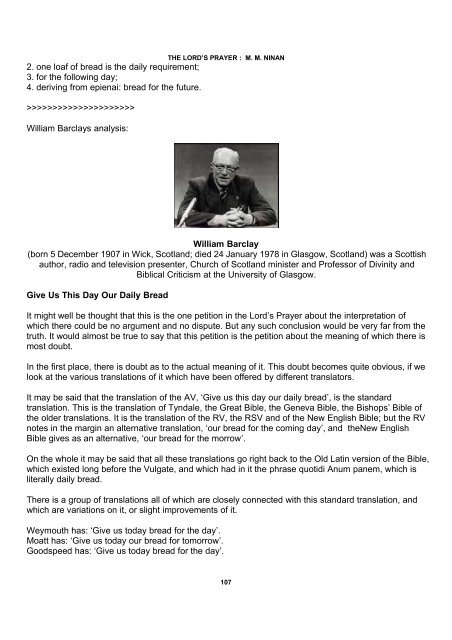Lord's Prayer
You also want an ePaper? Increase the reach of your titles
YUMPU automatically turns print PDFs into web optimized ePapers that Google loves.
2. one loaf of bread is the daily requirement;<br />
3. for the following day;<br />
4. deriving from epienai: bread for the future.<br />
>>>>>>>>>>>>>>>>>>>>><br />
William Barclays analysis:<br />
THE LORD’S PRAYER : M. M. NINAN<br />
William Barclay<br />
(born 5 December 1907 in Wick, Scotland; died 24 January 1978 in Glasgow, Scotland) was a Scottish<br />
author, radio and television presenter, Church of Scotland minister and Professor of Divinity and<br />
Biblical Criticism at the University of Glasgow.<br />
Give Us This Day Our Daily Bread<br />
It might well be thought that this is the one petition in the Lord’s <strong>Prayer</strong> about the interpretation of<br />
which there could be no argument and no dispute. But any such conclusion would be very far from the<br />
truth. It would almost be true to say that this petition is the petition about the meaning of which there is<br />
most doubt.<br />
In the first place, there is doubt as to the actual meaning of it. This doubt becomes quite obvious, if we<br />
look at the various translations of it which have been offered by different translators.<br />
It may be said that the translation of the AV, ‘Give us this day our daily bread’, is the standard<br />
translation. This is the translation of Tyndale, the Great Bible, the Geneva Bible, the Bishops’ Bible of<br />
the older translations. It is the translation of the RV, the RSV and of the New English Bible; but the RV<br />
notes in the margin an alternative translation, ‘our bread for the coming day’, and theNew English<br />
Bible gives as an alternative, ‘our bread for the morrow’.<br />
On the whole it may be said that all these translations go right back to the Old Latin version of the Bible,<br />
which existed long before the Vulgate, and which had in it the phrase quotidi Anum panem, which is<br />
literally daily bread.<br />
There is a group of translations all of which are closely connected with this standard translation, and<br />
which are variations on it, or slight improvements of it.<br />
Weymouth has: ‘Give us today bread for the day’.<br />
Moatt has: ‘Give us today our bread for tomorrow’.<br />
Goodspeed has: ‘Give us today bread for the day’.<br />
107


















